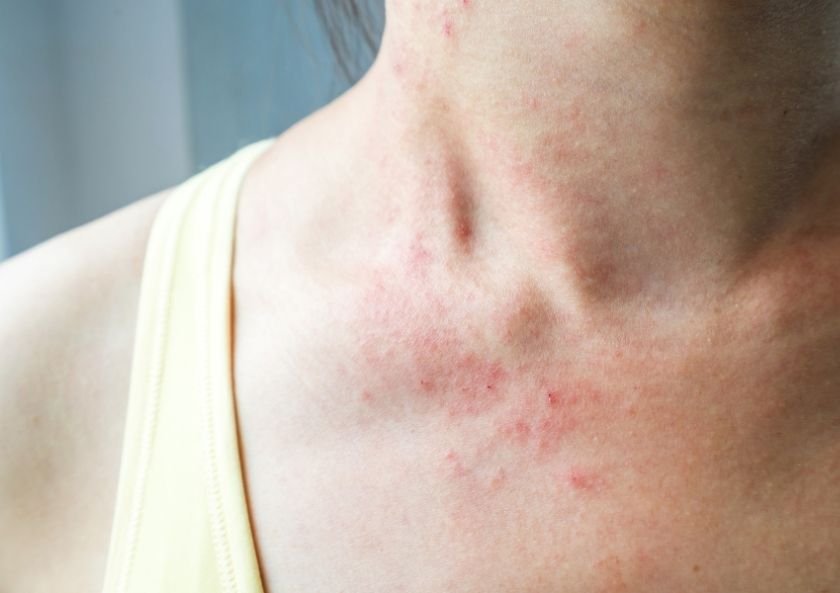What is Allergy and Atopy in Adults? Allergy is an excessively exaggerated and harmful defense reaction of the body against a normally harmless substance or substances called allergens found in our environment in some people with a genetic predisposition from birth.
Allergy can be described as an overreaction of our body’s immune system to things that are not actually harmless. There are two important points in this definition. First; the fact that there are factors that are not a part or building block of our body, but that somehow interact and come into contact with our body. E.g; such as food, pollen, insect bites, drugs, animals… Our skin, gastrointestinal system or respiratory system, which are the systems of the human body that communicate with the outside world, do not remain unresponsive to what is happening in the environment. It reacts to protect and defend itself. The second important point is that this reaction is excessive in some people.
How Allergy and Atopy Develop in Adults?
When we look at how allergy develops in adults, it is seen that the defense cells of our immune system, which are responsible for protecting us, give an excessive and potentially harmful response to substances called allergens that sensitize the body. Allergens can enter the body by inhalation, by ingestion in the form of foods and drugs, by contact through the skin or mucous membranes, or by injection.
The allergen, which enters our body in this way, causes a protective type of immune response with the synthesis of IgG antibodies in normal people, while it stimulates some blood cells to synthesize specific immunoglobulin E antibodies after a series of reactions in allergy-prone people. The formed IgE antibodies make the person sensitive to this allergen. In the subsequent encounter with this allergen, it binds to the IgE antibodies attached to the mast cells, which take on the most important task in the emergence of the complaints of allergic people, and causes typical allergic symptoms with the release of histamine and some other strong chemical mediators from these cells, which are the most important factors in the complaint of itching. The antihistamine drugs we use can therefore eliminate our itching.
The immune system has undertaken the task of defending us against foreign substances. This is quite a complex process. But sometimes the immune system loses control of itself and starts to overreact to certain substances that do not pose a threat or danger, which we encounter many times. This reaction is unfortunately not forgotten by our immune system, on the contrary, it continues stronger. As a result, this reaction, which is harmful to the organism, is called hypersensitivity, “hypersensitivity” or “allergy”. It’s not just a reaction. Because it occurs in various ways, in different organs of the body and as various allergic diseases with varying degrees of severity. Allergic disease is the condition in which allergy symptoms are seen in people who are prone to allergies.
The main allergic diseases are:
- Allergic rhinitis (hay fever)
- Asthma
- Eczema
- Food allergy
- Eye allergy
- Drug allergy
- Insect allergy
- Latex allergy
- Contact allergy
What Is Allergy Susceptibility (Atopy) in Adults?
Every person carries their genetic codes at birth, and some of these genetic codes cause us to overreact to allergens, that is, to be prone to allergies. Atopy, or predisposition to allergies, is a condition in which a person is genetically predisposed to develop allergies.
Which Diseases Are Atopic?
Not all allergic diseases are atopic. Major atopic diseases are allergic rhinitis, allergic asthma and atopic dermatitis. The main feature of these diseases is that genetic factors are important, that is, many patients have similar diseases in their first-degree relatives and they can be together. It is common for atopic dermatitis, which was present in infancy, to manifest itself later with allergic rhinitis and later with allergic asthma in the same person.
Does Childhood Prevention Prevent the Development of Allergy in Adulthood?
People who have allergic diseases in their parents are considered atopic and may encounter allergic diseases sometimes in childhood and sometimes later in their lives. It cannot be said that an atopic child will necessarily develop an allergic disease. Genetic predisposition is important in relation to allergies, but other important factors are environmental factors. If measures are taken to prevent the development of an allergic disease, the chance of developing an allergic disease can be reduced. If a cat or latex allergy sufferer stays away from these allergens, perhaps allergic rhinitis or asthma complaints may not occur at all.
As a result;
Atopic (prone to allergies) people are likely to develop allergic diseases in the future. If precautions are taken in childhood, the development of allergic diseases can be prevented in the future.



